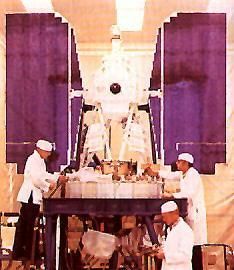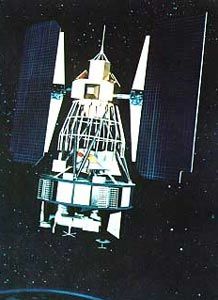
Home - Search - Browse - Alphabetic Index: 0- 1- 2- 3- 4- 5- 6- 7- 8- 9
A- B- C- D- E- F- G- H- I- J- K- L- M- N- O- P- Q- R- S- T- U- V- W- X- Y- Z
Landsat 1-2-3
 Landsat 3 Credit: NASA |
AKA: ERTS. Status: Operational 1972. First Launch: 1972-07-23. Last Launch: 1978-03-05. Number: 3 . Gross mass: 910 kg (2,000 lb). Height: 3.02 m (9.90 ft). Span: 4.00 m (13.10 ft).
Their images demonstrated the usefulness of remote sensing data for land surveys, land management, water resource planning, agricultural forecasting, forest management, sea ice movement, and cartography.
When Landsat 1 was finally removed from service in January 1978 due to tape recorder faults, it had returned over 300,000 images. Landsat 2 was removed from service on 25 February 1982, and Landsat 3 was removed from service on 31 March 1983. Archived images from these missions were available through EOSAT.
The spacecraft design had significant inheritance from the Nimbus program (also manufactured by General Electric). The satellites were 3-axis stabilized using 4 momentum wheels to 0.7 deg accuracy. Twin solar paddles (single-axis articulation) provided 1000 W (BOL peak), 515 W (BOL average) and recharged NiCd batteries. S-Band and VHF communications were via a 1 W transponder. The hydrazine propulsion system had 3 thrusters. Data downlink rate was 15 Mbps. The payload included the Carried Return Beam Vidicon (RBV) and Multi-Spectral Scanner (MSS) imaging sensors. The MSS covered 0.5 to 12.6 µ m and provided 75 m resolution at best with a 185 km swath width. The RBV covered 0.5 to 0.75 µ m and provided 40 m resolution with a 185 km swath width. Payload mass was about 150 kg.
More at: Landsat 1-2-3.
Family: Earth, Earth land resource sat, Sun synchronous orbit. Country: USA. Spacecraft: Landsat. Launch Vehicles: Thor, Delta, Delta 0900, Delta 2910, Delta 0100, Delta 2000. Launch Sites: Vandenberg, Vandenberg SLC2W. Agency: NASA, Astro Space. Bibliography: 2, 279, 6, 12754.
 | Landsat 1 Credit: Manufacturer Image |
1972 July 23 - . 18:06 GMT - . Launch Site: Vandenberg. Launch Complex: Vandenberg SLC2W. LV Family: Thor. Launch Vehicle: Delta 0900.
- Landsat 1 - .
Payload: ERTS A. Mass: 816 kg (1,798 lb). Nation: USA.
Agency: NASA Greenbelt.
Program: Landsat.
Class: Earth.
Type: Earth resources satellite. Spacecraft Bus: Nimbus.
Spacecraft: Landsat 1-2-3.
USAF Sat Cat: 6126 . COSPAR: 1972-058A. Apogee: 909 km (564 mi). Perigee: 898 km (557 mi). Inclination: 99.10 deg. Period: 103.10 min.
The first Long Tank Thrust Augmented Thor/Delta to be launched from Vandenberg AFB using nine solid rocket motors successfully placed the Environmental Resources Technology Satellite (ERTS-A) in orbit. Earth Resources Technology Satellite. Spacecraft engaged in practical applications and uses of space technology such as weather or communication (US Cat C).
1975 January 22 - . 17:55 GMT - . Launch Site: Vandenberg. Launch Complex: Vandenberg SLC2W. LV Family: Thor. Launch Vehicle: Delta 2910.
- Landsat 2 - . Payload: Landsat B. Mass: 953 kg (2,101 lb). Nation: USA. Agency: NASA Greenbelt. Program: Landsat. Class: Earth. Type: Earth resources satellite. Spacecraft Bus: Nimbus. Spacecraft: Landsat 1-2-3. USAF Sat Cat: 7615 . COSPAR: 1975-004A. Apogee: 913 km (567 mi). Perigee: 900 km (550 mi). Inclination: 99.30 deg. Period: 103.10 min. Spacecraft engaged in practical applications and uses of space technology such as weather or communication (US Cat C)..
1978 January - .
- Landsat 1 removed from service. - . Nation: USA. Spacecraft Bus: Nimbus. Spacecraft: Landsat 1-2-3. Landsat 1 was finally removed from service in January 1978 due to tape recorder faults. It had returned over 300,000 images..
1978 March 5 - . 17:54 GMT - . Launch Site: Vandenberg. Launch Complex: Vandenberg SLC2W. LV Family: Thor. Launch Vehicle: Delta 2910.
- Landsat 3 - . Payload: Landsat C. Mass: 960 kg (2,110 lb). Nation: USA. Agency: NASA Greenbelt. Program: Landsat. Class: Earth. Type: Earth resources satellite. Spacecraft Bus: Nimbus. Spacecraft: Landsat 1-2-3. USAF Sat Cat: 10702 . COSPAR: 1978-026A. Apogee: 915 km (568 mi). Perigee: 895 km (556 mi). Inclination: 98.90 deg. Period: 103.10 min. Spacecraft engaged in practical applications and uses of space technology such as weather or communication (US Cat C)..
1982 February 25 - .
- Landsat 2 removed from service. - . Nation: USA. Spacecraft Bus: Nimbus. Spacecraft: Landsat 1-2-3.
1983 March 31 - .
- Landsat 3 removed from service. - . Nation: USA. Spacecraft Bus: Nimbus. Spacecraft: Landsat 1-2-3.
Back to top of page
Home - Search - Browse - Alphabetic Index: 0- 1- 2- 3- 4- 5- 6- 7- 8- 9
A- B- C- D- E- F- G- H- I- J- K- L- M- N- O- P- Q- R- S- T- U- V- W- X- Y- Z
© 1997-2019 Mark Wade - Contact
© / Conditions for Use